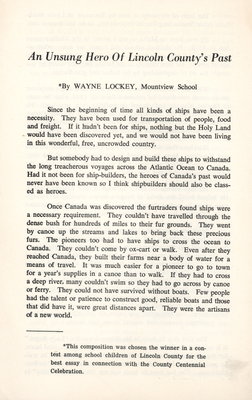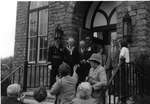An Unsung Hero of Lincoln County's Past
*By WAYNE LOCKEY, Mountview School
Since the beginning of time all kinds of ships have been a necessity. They have been used for transportation of people, food and freight. If it hadn't been for ships, nothing but the Holy Land would have been discovered yet, and we would not have been living in this wonderful, free, uncrowded country.
But somebody had to design and build these ships to withstand the long treacherous voyages across the Atlantic Ocean to Canada. Had it not been for ship-builders, the heroes of Canada's past would never have been known so I think shipbuilders should also be classed as heroes.
Once Canada was discovered the furtraders found ships were a necessary requirement. They couldn't have travelled through the dense bush for hundreds of miles to their fur grounds. They went by canoe up the streams and lakes to bring back these precious furs. The pioneers too had to have ships to cross the ocean to Canada. They couldn't come by ox-cart or walk. Even after they reached Canada, they built their farms near a 'body of water for a means of travel. It was much easier for a pioneer to go to town for a year's supplies in a canoe than to walk. If they had to cross a deep river, many couldn't swim so they had to go across by canoe or ferry. They could not have survived without boats. Few people had the talent or patience to construct good, reliable boats and those that did have it, were great distances apart. They were the artisans of a new world.
The hero of my story, a man by the name of Lewis Shickluna, came from a long line of shipbuilders, so he too became one.
He was born in Malta, a small island in the Mediterranean Sea in 1808. He disliked school and found too many other attractions to call him away from it, so his family let him quit at the age of seven. He went directly to the family shipyard where he was taught the art of shipbuilding by his father and grandfather.
When he was sixteen he obtained work as a ship's carpenter on an ocean vessel and he remained there till 1831 when he came to Quebec, Canada and started shipbuilding in a new land. He worked here on the first steamboat to cross the Atlantic Ocean. It was named the "Royal William" after a British Sovereign. After crossing the Atlantic, it saw service between Britain and Spain.
Shickluna then moved to Oakville, Ontario, between Toronto and Hamilton. Here he assisted in the construction of the ship, "The Transit" which was later used as a troop carrier during the 1837 Rebellion of Upper Canada.
He then moved on closer to what is now Lincoln County. He helped build the docks at Niagara before crossing to Youngstown where he studied draughting for two years and built two more ships, "The John Porter," and, "The L. Shickluna".
Shickluna came to St. Catharines in 1836 at the age of twenty-eight. He had already had twenty-one years' experience in shipbuilding and was the answer to the settler's dream; a shipbuilder to supply one of their most needed requisites. Twenty years before Lincoln County became a reality, he established a shipyard on the Twelve-Mile Creek below what is now the Burgoyne Bridge on the present site of the Morton Building Wrecking Company. He worked diligently here till his death in the late 1800's and strove ever to serve his fellowmen by supplying them with an urgent necessity. From here he built and launched twenty-three schooners, twelve barquentines, one brigantine, one yacht, six propellers, several tugs, one passenger steamer and several scows and barges.
The first ship he built in his shipyard was the "Lady Bagot." It is said that his first six years were spent repairing the canal boats, for the original Welland Ship Canal had just opened and its traffic passed his yard and followed the course of the "Twelve" to Port Dalhousie. The last boat he built was the "Sir Leonard Tilley" in honour of that famous Father of Confederation. She was a composite propeller craft. In all, he built over two hundred boats, we know of, to add to lake traffic; and since we know the original canal locks were one hundred feet long by twenty-two feet wide we can judge the size of craft (possibly) constructed. Many, he named after famous local citizens, for example — in 1855 "W. H. Merrit," in 1865 — "Mary Merrit," 1866 —"Jane C. Woodruff," and countless more.
In those days, St. Catharines was only a little clearing surrounded by swamp and dense bush. It is said that Lewis Shickluna could go into any given section of the forest and estimate the cost of the wood down to the nearest cent. His choice of material for his boats was questioned by no one. The first editor and publisher of the St. Catharines paper, Mr. Samuel G. Montgomery who was a personal friend, said, "If Lewis Shickluna said a thing, it was so," indicating the high regard that was held for his opinions and integrity.
Lincoln County at this time was "an underground railroad" for slaves escaping from the United States. These men he employed in his yards thus giving some of them their first gainful occupation. He taught many men his trade so they might carry on long after he was gone.
In 1852 he built and launched the first ocean going vessel made in St. Catharines and named it the "Pride of Canada." This was one hundred and four years ago and it sailed directly to England. In the same year he built "The Welland" in which was installed the first St. Catharines made engine. Its builder was Thomas Towers. The ship was later destroyed by fire in Port Dalhousie harbour. Some of his other ships were the "Chief Justice Robinson," the "John L. Ranney" and the "Augusta". All were noteworthy craft built for the Norris and Neelon Company. Shickluna is reported to have once stated: "I never had a want of money. I always had plenty." This is in itself tribute to a great man with little formal education who by diligent application made himself a useful, productive, thoughtful citizen. By hard work he established a shipyard estimated at present value at over four million dollars and in it he gave of his skill until the late 1800's.
He had married a Miss Hainer, daughter of John Hainer who with a Jacob Dittrick in 1796 were the first settlers along The Twelve. By now the family name Shickluna has disappeared in St. Catharines. HQs descendants may be found in other families but are not easily traced. No stone is erected to his honour and one tiny unpaved street by the tracks is all that bears his name.
In this Centennial year we proudly salute Lincoln County and as we recall the past may we not forget this unsung hero who did so much for settlers in early days.
Ye say they all have passed away,
That noble race and brave;
That their light canoes have vanished
From off the crested wave;
That mid the forests where they roamed
There rings no hunters shout;
But their name is on your waters,
Ye may not wash it out.
'Tis where Ontario's billow
Like Ocean's surge is curled,
Where strong Niagara's thunders wake
The echo of the world.
(Lydia H. Sigourney)




